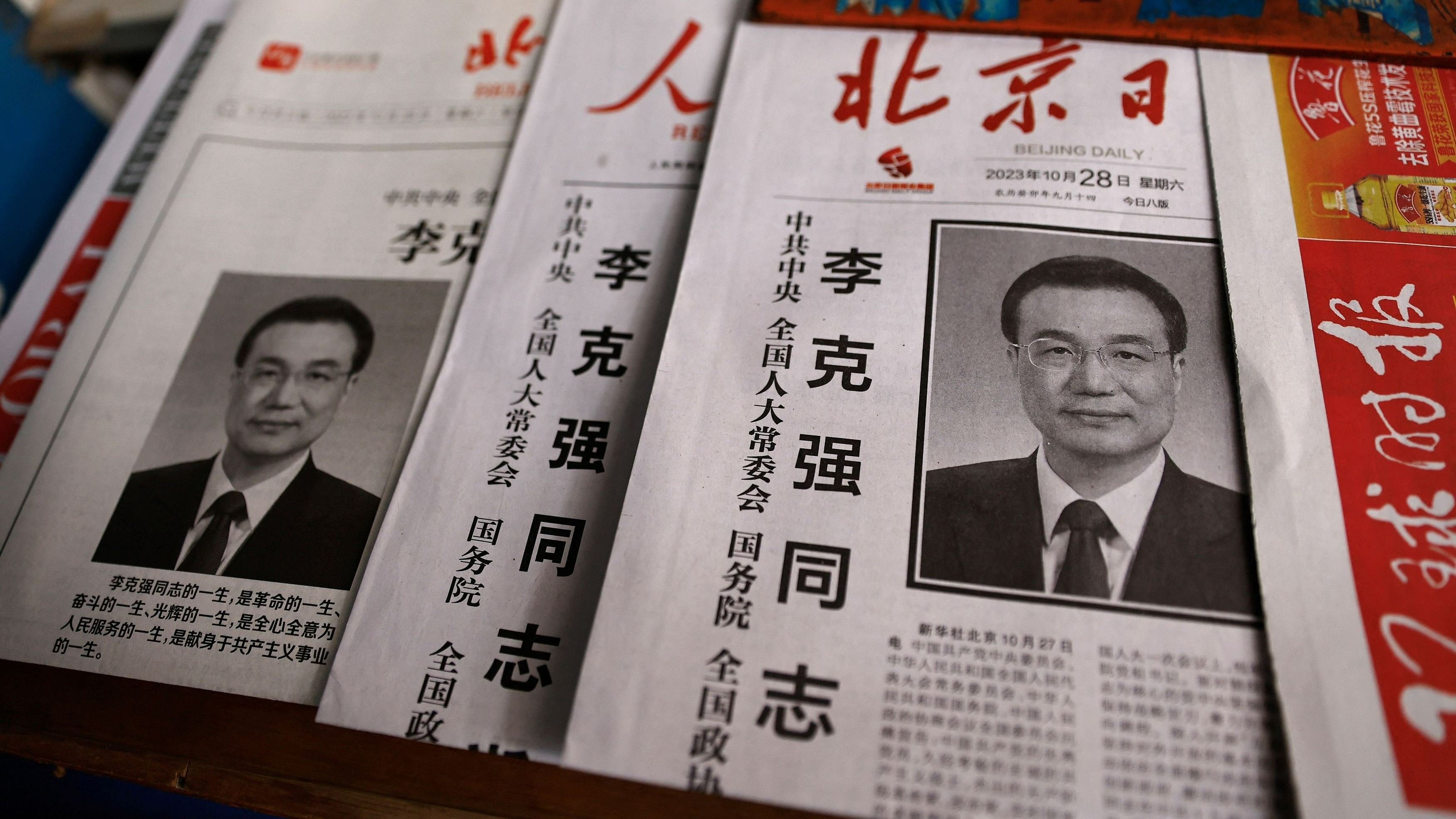
Newspapers with the obituary of late former Chinese Premier Li Keqiang on the front page are displayed, at a newsstand in Beijing, China October 28, 2023.
Credit: Reuters Photo
The sudden demise of Li Keqiang, known as the ‘people’s premier’, on October 27 at the age of 68 in Shanghai has shocked the world. Li is to be cremated on November 2, and flags across China, Hong Kong, and Macau are to be at half-mast.
Li served as a premier for a decade (2013 to 2023) with Xi Jinping; however, with Xi amassing extensive power, Li’s role continued to diminish and in turn his influence and policies had limited impact. He was expected to be a strong contender for the President’s post in 2012, however, he was appointed as the number two.
Li’s death has sparked a flurry of comparisons with Xi. In the words of Steve Tsang, “remembering Li fondly is a veiled articulation of unhappiness about Xi”. By contrast the official announcement characterises Li as “an excellent CPC member, a time-tested and loyal communist soldier and an outstanding proletarian revolutionist, statesman and leader”.
Going by the history of China, the death of prominent leaders has proved to be an opportunity for the people to express their grievances. The death of Zhou Enlai in 1976 and Hu Yaobang in 1989 proved challenging for the CCP. A similar trend is visible even now.
The stark comparisons with Xi and the hope that the direction of Chinese growth and politics would have been different under Li directly questions Xi’s position. To add to this, Xi is perceived as a more uptight and alienated leader, while Li was perceived to be one who understood the people’s demands and needs. Videos of Li being present immediately after most of the natural calamities and during the Covid-19 pandemic show him in a better light.
Li also challenged Xi as he did not belong to the group of the ‘princelings’. He was close to Hu Jintao and the tuanpai, the members of the CCP’s youth league. However, under Xi this group has been consistently sidelined and the number of Xi’s supporters have risen. Because Li was from the tuanpai, he was perceived to be self-made and stood in stark contrast to Xi’s image of gaining from his father’s legacy.
The CCP has urged some prominent universities to not organise any private mourning as a way to manage the social sentiments. Chen Daoyin, a former professor at the Shanghai University of Political Science and Law, said that “Beijing is doing everything it can to reign in the potential political risks of Li’s unexpected death”. The CCP has also issued directives which are urging people to refrain from organising memorials and move away from the party’s official line. As expected, the CCP’s censor board is in full swing even banning searches and blocking songs like ‘Sadly, It’s Not You’ by Malaysian singer Fish Leong.
Large crowds have gathered at Li’s childhood house in Anhui. There have been outbursts by mourners who have called other leaders ‘corrupt’. The sea of white and yellow flowers here has become a challenge for Xi and a show of love and affection towards Li. Xi is using his control over the Internet and removing certain videos of Li while the security is also scrutinising the cards which people sign with the flowers.
Li’s death has pushed the people to compare and long for the alternative which he stood for, one of more economic reform and more space for private entrepreneurs. Xi has pushed for more State control in every aspect of people’s lives, the heavy zero Covid policy underscored this approach. When coupled with the sluggish Chinese economy and more restrictions on the private sector and mounting unemployment, highlights an economy which is squarely under the control of the government with the prime agenda of maintaining peace and stability.
China under Xi had shown signs of not aligning with Li’s political approach since the beginning. In the last decade, Li was marginalised and so were his policies and people, thus, reducing space for voicing his policies. Xi believes in centralisation and a strongman approach to problems and challenges to the stability of the CCP. It is the stability of the CCP which is the most important task for Xi. By contrast, Li was perceived to be one for whom it is the people who mattered and their problems and mitigating these were his primary concern. His death is forcing people to feel a loss of voice as well as the hope that someone who cared for them existed.
Li’s death and how Xi handles this will be a major challenge for China’s political future. In the given scenario, the more Li is sidelined, and his policies underappreciated, the more the people of China will feel marginalised under Xi.
(Gunjan Singh is Assistant Professor, OP Jindal Global University.)
Disclaimer: The views expressed above are the author's own. They do not necessarily reflect the views of DH.